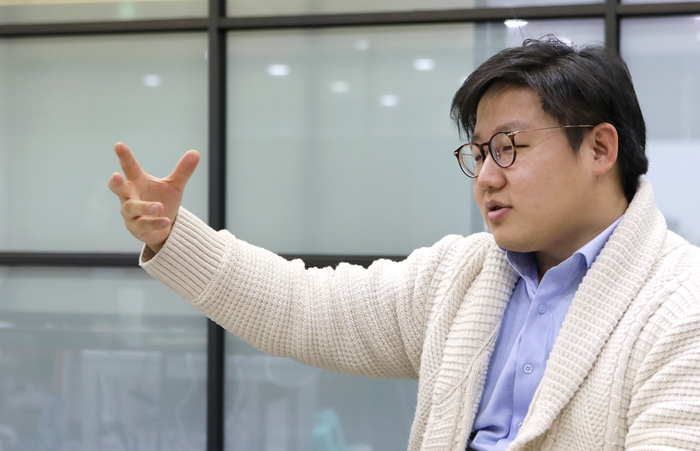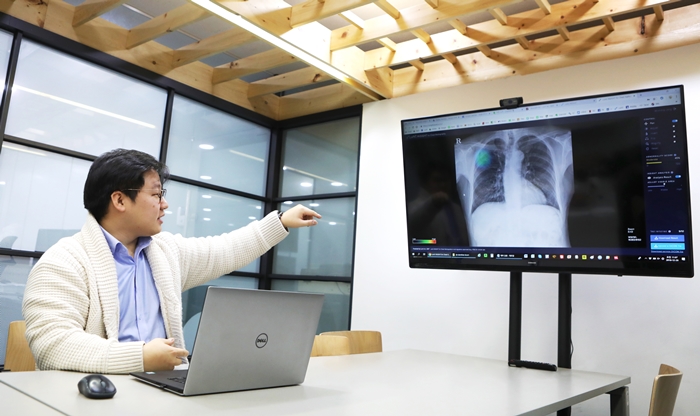
Lunit CEO Brandon B. Suh on Dec. 28 discusses his company's medical AI software designed to raise efficiency in diagnosis and treatment at his office in Seoul’s Yeoksam-gu District. (Kim Sunjoo)
By Jung Joori and Lee Hana
Seoul | Dec. 28, 2018
Korea.net in 2019 will feature startups leading innovative growth in various sectors of the Korean economy.
The third article in this series is about Lunit, a company specializing in AI-powered software for medical image analysis and devoted to advancing medical intelligence to the next level.
The third article in this series is about Lunit, a company specializing in AI-powered software for medical image analysis and devoted to advancing medical intelligence to the next level.
Imagine that a patient with a persistent cough goes to see a doctor. After being briefed on the symptoms, the doctor will likely take a chest X-ray of the patient. Based on this radiograph, the doctor will look for abnormalities and perform a CT scan if something serious is detected.
Now imagine a different scenario in which an artificial intelligence (AI) device scans the same chest X-ray and finds abnormalities invisible to the human eye. This means a problem can be diagnosed early on and raise the likelihood of a full recovery.
Lunit, a Korean company specializing in AI-powered medical image analysis software, is banking on this very technology. Its medical solutions are based on deep learning algorithms that help doctors more accurately diagnose patients by detecting abnormalities in radiographs.
AI is considered a major growth engine of the Fourth Industrial Revolution, though advances in this field have fueled fear as well as anticipation. Lunit, however, stresses that its vision for its products shines a positive light on AI’s future given that the company’s goal is enhancing human capabilities rather than replacing people.
Korea.net spoke to Lunit CEO Brandon B. Suh on Dec. 28 at his company’s headquarters in Seoul’s Yeoksam-gu District to find about more about this cutting-edge technology.
"Innovation is the marriage of novelty and utility. Originality is important but we cannot call it innovation unless it has a useful function," he said. "I decided to apply our AI software to medicine because a one-percent increase in accuracy in this sector can save more lives than in any other field."

Lunit CEO Brandon B. Suh on Dec. 28 runs a diagnosis on the Lunit INSIGHT for Chest Radiography at his company’s headquarters in Seoul. An abnormality is indicated by a different color. (Kim Sunjoo)
AI algorithm development backed by vast medical data
Founded in 2013, Lunit features among its products the Lunit INSIGHT for Chest Radiography, a deep learning software that diagnoses chest X-rays, and the Lunit INSIGHT for Mammography, a software for breast diagnosis and screening. Both software solutions show potential abnormalities with a heat map and calculate an abnormality score as a percentage, allowing doctors to make a final diagnosis based on these results.
"Chest radiography and mammography are among the most commonly used diagnostic procedures, performed over a trillion times annually in hospitals around the world. Unlike CT scans and MRIs, however, both of these methods compress 3-D images into 2-D ones, which affects diagnostic accuracy. This is what motivated us to develop our products," said Suh.
Lunit collects its data from 18 medical institutions including Seoul National University Hospital, Asan Medical Center, the University of California’s San Francisco Medical Center and the University of Texas MD Anderson Cancer Center. This is because diagnostic accuracy depends heavily on deep learning of a vast amount of data. In this respect, Korea's high level of medical accessibility has proven considerably useful.
"Compared to the U.S. or China, medical costs in Korea are relatively low, which means diagnostic procedures are run more often and produce more data. Because most critically ill patients tend to be concentrated in Seoul's major hospitals, data collection is easy for us," Suh said.

Lunit CEO Brandon B. Suh (second from right) in November 2018 is joined by renowned diagnostic radiologists Eliot Siegel (third from right) and Khan Siddiqui (fourth from right) at the annual meeting of the Radiological Society of North America (RSNA) in Chicago. (Lunit)
Globally acclaimed AI software
Lunit's deep learning software has won top prizes at international competitions. In 2017, it earned the grand prize at the CAMELYON Grand Challenge, a pathology competition whose goal is to evaluate new and existing algorithms for automated detection and classification of breast cancer metastases in whole-slide images of node sections.
The same year, Lunit was the only Korean company to receive a mention on CB Insight's list of the world’s 100 most promising companies in private intelligence.
The addition of globally renowned diagnostic radiologists to the company’s panel of experts has also helped raise Lunit’s brand. The list of consultants includes Eliot Siegel of the University of Maryland’s School of Medicine, a leading authority on digital medical imaging. Another is Khan Siddiqui of Johns Hopkins University, who is chief technology and marketing officer of Higi, a medical technology company that creates health station kiosks to allow patients to measure, track and act on their health statistics.
Suh said Lunit can make great medical strides using AI technology, adding, "Our long-term goal is to help doctors diagnose illnesses undetectable by the human eye and ultimately help as many patients as we can in the process."
etoilejr@korea.kr